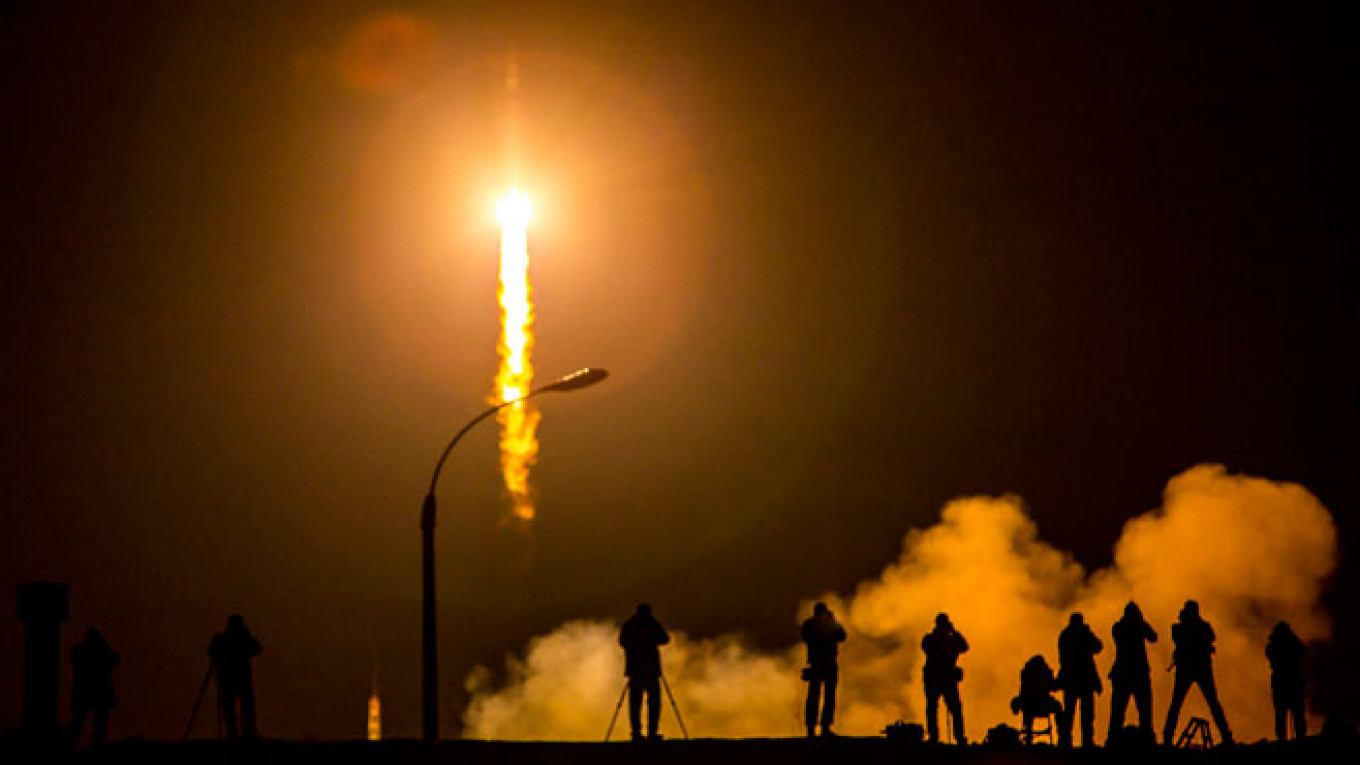NASA may have been drawn into a political battle taking place within Roscosmos to protect the Russian space agency's funding streams amid an economic crisis, Russian space experts said.
Roscosmos chief Igor Komarov on Saturday suggested that Russia and the United States would join together to build another space station after the current International Space Station (ISS) project ends in 2024.
But the announcement appeared to be wishful thinking — NASA's chief in Russia, Sean Fuller, denied to the Moscow Times on Tuesday that an agreement had been reached, and analysts said the statement was aimed at influencing space funding decisions in Russia's government.
"Some of the things said were taken out of context, but [we] certainly discussed future opportunities for cooperation," Fuller said, explaining that the focus of the discussions was on making the most of the ISS through 2024.
The space partnership is one of the few aspects of U.S.-Russia relations that has not been impacted by the crisis in Ukraine, and according to Fuller even talk of future projects has continued between the two country's space agencies.
Komarov's announcement on Saturday may have been an attempt to influence government decision-making as he presides over a complete rewrite of the Federal Space Program 2016-2025 — a key planning document that will lay out Russia's activities in space over the next decade.
The program was supposed to be submitted to the government last year, but Russia's economic crisis has forced officials to gut the original proposal and take a careful look at what is actually achievable.
Komarov is fighting to limit the cuts, and nothing he says should be taken seriously before the unveiling of the new federal space agenda, said Vadim Lukashevich, a Russian space expert formerly of the Skolkovo Innovation Center.
Komarov's NASA gambit is a play to get his way on space station policy, said Yury Karash, a space policy expert at the Russian Academy of Cosmonautics.
Roscosmos wants to separate its modules from the ISS in 2024 and use them to form the nucleus of a new space station that other interested participants such as China, other BRICS nations and even the United States would be welcome to join.
By announcing U.S. participation, Komarov was trying to make this plan more credible to the Russian government, Karash said.
But the idea is far-fetched — NASA has said it wants to see the budding U.S. private space industry pick up the task of building a space station to succeed the ISS while the agency refocuses on deep space exploration.
The ISS became a Russian political football last year. With U.S.-Russia relations sunk to a post-Cold War low after Moscow's annexation of Crimea, Roscosmos lost control of Russian space policy as high-ranking government officials threatened to pull out of the ISS project.
However, as Russia's economic situation has worsened the harsh rhetoric has softened. Russian space officials are now talking openly of future cooperation.
But Russia's actions in Ukraine have re-energized voices on the other side of the divide that might seek to prevent any future space projects with Russia — namely the U.S. Congress.
"Even after the normalization of Russian-American relations, the U.S. will be wary of large joint projects," said Vadim Lukashevich, a prominent Russian space expert and commentator.
Though NASA was polite in its denial of Komarov's statement and the agency said it supported cooperation, Karash said NASA was not likely to expend political capital at home on pursuing another large joint project with Roscosmos.
"Everybody knows that [NASA chief Charles] Bolden won't move his finger to start a new space rapprochement with Russia until it is approved by Congress and the White House," Karash said.
"And the chances for such approval in the current context of U.S.-Russian relations are close to zero.
The fundamental reality remains, Lukashevich said: "We are not partners, we are rivals and strategic opponents."
"You can forget about a partnership in space for the time being," he concluded.
A Message from The Moscow Times:
Dear readers,
We are facing unprecedented challenges. Russia's Prosecutor General's Office has designated The Moscow Times as an "undesirable" organization, criminalizing our work and putting our staff at risk of prosecution. This follows our earlier unjust labeling as a "foreign agent."
These actions are direct attempts to silence independent journalism in Russia. The authorities claim our work "discredits the decisions of the Russian leadership." We see things differently: we strive to provide accurate, unbiased reporting on Russia.
We, the journalists of The Moscow Times, refuse to be silenced. But to continue our work, we need your help.
Your support, no matter how small, makes a world of difference. If you can, please support us monthly starting from just $2. It's quick to set up, and every contribution makes a significant impact.
By supporting The Moscow Times, you're defending open, independent journalism in the face of repression. Thank you for standing with us.
Remind me later.






